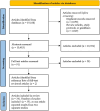Psychosocial moderators of the effect of lifestyle interventions in primary prevention of cardiovascular disease: a scoping review
- PMID: 40885900
- PMCID: PMC12398150
- DOI: 10.1186/s12889-025-24076-2
Psychosocial moderators of the effect of lifestyle interventions in primary prevention of cardiovascular disease: a scoping review
Abstract
Background: Lifestyle modification plays a key role in prevention of cardiovascular disease (CVD), but often fails due to non-adherence to lifestyle recommendations. Previous research has highlighted the importance of psychosocial factors in non-adherence, though focused on secondary rather than primary prevention. The aim of this scoping review was to provide an overview of the moderating role of psychosocial factors on the effect of lifestyle interventions in primary CVD prevention.
Methods: A literature search of scientific databases was performed to identify studies published in peer-reviewed journals, that evaluated lifestyle interventions in primary prevention in adult populations (18 years and older), with a composite CVD risk score or a CVD risk factor (diet, physical activity, smoking or alcohol) as outcome, and assessed the moderating effect of a psychosocial factor.
Results: Thirty-five studies published between 2000 and 2025 were included in this review. Most were randomized controlled trials (RCT), included middle-aged participants, and investigated samples in which women were in majority. The outcomes differed, with fourteen studies reporting on physical activity, eleven on diet, six on body weight, two on smoking and one on alcohol. One study used a CVD risk score as the outcome. The studies included a broad array of psychological factors that were grouped into five categories: self-efficacy or motivation (n = 11), social support or relationship quality (n = 8), mental health (n = 6), personality or emotions (n = 6), and cognitive factors (n = 4). Sixteen (44%) of the studies did not use validated instruments in the assessment of the psychosocial factor.
Conclusions: This review highlights the potential role of psychosocial factors on the effectiveness of lifestyle interventions. However, our ability to draw detailed conclusions or identify any general trends were limited by the heterogeneity amongst the studies in terms of study design, assessment of outcomes and moderators, and populations. Still, we identified a lack of RCTs (1) with long follow-up time, (2) with sufficient sample size, (3) using validated instruments to assess the psychosocial moderator, and (4) using interaction analyses to assess moderating effect.
Trial registration: This scoping review was registered at Open Science Framework (osf.io) under 10.17605/OSF.IO/VEADK on December 19, 2023.
Supplementary Information: The online version contains supplementary material available at 10.1186/s12889-025-24076-2.
Keywords: Behavior change; Health behavior; Lifestyle modification; Moderator; Psychosocial; Public health.
Conflict of interest statement
Declarations. Ethics approval and consent to participate: Not applicable. Consent for publication: Not applicable. Competing interests: The authors declare no competing interests.
Figures
References
-
- O’Donnell MJ, Xavier D, Liu LS, Zhang HY, Chin SL, Rao-Melacini P, et al. Risk factors for ischaemic and intracerebral haemorrhagic stroke in 22 countries (the INTERSTROKE study): a case-control study. Lancet. 2010;376(9735):112–23. - PubMed
Publication types
LinkOut - more resources
Full Text Sources


